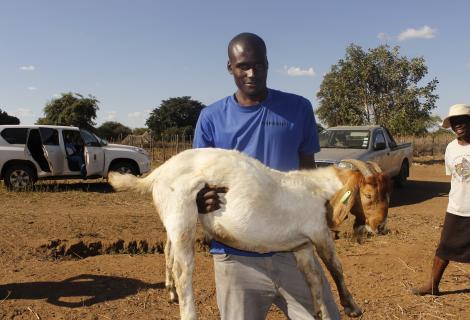Youths improve livelihoods through resilience building programme

Simbarashe Zinduru, a 31year old farmer from Chirunya village, Ward 8, Mbire District is among 10 186 youths who are actively engaging in various resilience building projects which have improved their livelihoods and created employment. The projects are namely crop and livestock production, building and carpentry. The youths are from three districts which are Mbire, Kariba and Binga participating in a resilience project called Zimbabwe Resilience Building Fund (ZRBF). The programme is being implemented in the Zambezi Valley with ActionAid Zimbabwe the lead organisation working in partnership with Zimbabwe Environment Lawyers Association (ZELA), AfroSoft Private Limited and Africa Breeders Services Total Cattle Management (ABS TCM).
The ZRBF programme in the Zambezi Valley which focuses on increasing resilience capacities of communities in Binga, Kariba and Mbire Districts to protect their development gains and improve their well-being in the face of shocks and stresses edified youths in the Zambezi Valley.
Youths over the years have been lagging behind with regards to participation in viable projects such as livestock production and farming as a business. The ZRBF programme has increased youth participation which is promoting leadership in their developmental areas, shifting power from the elderly to young people. This is a transition from the previous years where youths used to rally behind adults and not fully participate in initiatives. Apart from livestock production and crop farming, the programme brought diversified youth activities like building and carpentry which have a faster turnaround. This has created youth employment which has seen youths trained under the ZRBF programme being contracted by Rural District Councils.
In Mbire, 32 youths are participating in livestock that is 20 males and 12 females respectively. Simbarashe is one of the 32 youths in Mbire who has managed to raise the flag high for youths in the ZRBF project within a short period of time, something which never happened in the history of the Zambezi Valley. He is married with three children. The young energetic man is inspiring others in the community especially youths through his success story.
His journey began in February 2017 when he joined the ZRBF project in Mbire District. He was equipped with expertise to venture into livestock production which includes pen fattening and artificial insemination (AI). Cattle pen fattening involves the feeding of beef cattle with a protein balanced, high-energy diet for a period of 90 days under confinement to increase live weights and improve quality and thus obtain better grades at the abattoir. Artificial insemination on the other hand is the process of collecting sperm cells from a male animal and manually depositing them into the reproductive region of a female. Artificial insemination is commonly used instead of natural mating in many species of animals because it cross breeds and produces good breeds of cattle. Farmers in Mbire adopted these processes because they saw an opportunity to penetrate the Zimbabwean market by producing good quality beef and producing good breeds of cattle as opposed to the past when they had poor breeds and could hardly breed cattle which surpasses 80kgs in weight. Now they are breeding cattle which are weighing 150kgs-200kgs.
The youthful farmer ventures into both crop and livestock production at his homestead although he has concentrated more on livestock production. He invested in improving his cattle breeds following lessons brought by the ZRBF project. He now has improved cattle which include Beef Master and Brahaman.
“When it comes to artificial insemination, l prefer Beef Master and Brahaman because when selling it has more meat and l can stand a chance of earning more money at the markets,” said Simba.
Simba received a boer goat from a ZRBF project which he has used to improve his goat breed. In addition to the boer he received, he purchased a boran type of goat bull to ensure his sustainability after he passes the donated bull to the next household. Currently, Simba has 38 cows and 120 goats which is an increase from 20 cows and 85 goats he owned before joining the ZRBF programme. In January 2019, the young farmer, sold 30 goats and got 700USD compared to about 400USD realised before being part of the ZRBF supported project,
With proceeds he got from selling his livestock, Simba invested in a solar powered water system to enhance supply of clean and safe water for household use, his livestock, irrigation of his fodder crop and watering his garden. Provision of water at his house has helped reduced the burden of unpaid care work on his wife as she used to fetch water at a community borehole which is about 5km away. His livestock no longer have to travel more than 4km in search of water but are supplied with water at the homestead. The water source at Simba’s home is also supporting other community members as they can access the water for free.
“Prior to joining the ZRBF programme, l had livestock and an idea of how to farm but l was limited because l did not have adequate knowledge of what exactly to do and how to penetrate the market. I appreciate the programme because it has opened doors for me and has taught me to take farming as a business,” Simba said.
Simba and other youths from Mbire district have successfully taken farming as a business which has improved their livelihoods.